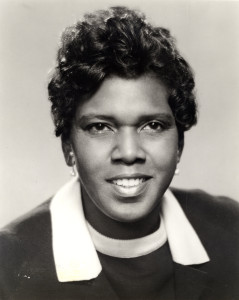
Barbara Jordan was born in the Fifth Ward of Houston, Texas to a Black Baptist minister, Benjamin Jordan, and a domestic worker, Arlyne Jordan. She attended Roberson Elementary and Phyllis Wheatley High School.
While at Wheatley, she was a member of the Honor Society and excelled in debating. She graduated in 1952 in the upper five percent of her class. She wanted to study political science at the University of Texas-Austin, but was discouraged because the school was still segregated.
She attended Texas Southern University and pledged Delta Sigma Theta Sorority. Barbara was a national champion debater, defeating her opponents from such schools as Yale and Brown and tying Harvard University.
In 1956, she graduated magna cum laude from Texas Southern with a double major in political science and history. She expressed an interest in attending Harvard University School of Law, but opted to go to Boston University and graduated in 1959.
Ms. Jordan taught political science at Tuskegee Institute in Alabama for one year before returning to Houston in 1960 to take the bar examination and set up a private law practice.
She ran for a seat in the Texas House of Representatives in 1962 and 1964, but lost both times…. however, she made history when she was elected to the newly drawn Texas Senate seat in 1966, thereby becoming the first Black to serve in that body since 1883. She was an oddity at that time, as the first Black woman in that state’s legislature.
Her brief record in the Texas State Senate is viewed as somewhat of a phenomenon. On March 21, 1967 she became the first Black elected official to preside over that body; she was the first Black state senator to chair a major committee, Labor and Management Relations, and the first freshman senator ever named to the Texas Legislative Council.
When the Texas legislature convened in special session in March, 1972, Senator Jordan was unanimously elected president pro tempore. She was the first African-American female to serve as president pro tem of the state senate and she was honored by being named Governor for a Day. Jordan served one day, June 10, 1972, as acting governor of Texas. Shortly, thereafter she decided to run for Congress and was elected, in Nov. 1972, from the newly drawn Eighteenth Congressional District in Houston.
Both as a state senator and as a U.S. Congressman, Jordan sponsored bills that championed the cause of poor, Black, and disadvantaged people. One of the most important bills as senator was the Workman’s Compensation Act, which increased the maximum benefits paid to injured workers. As a congresswoman, she sponsored legislation to broaden the Voting Rights Act of 1965 to cover Mexican Americans in Texas and other southwestern states and to extend its authority to those states where minorities had been denied the right to vote or had had their rights restricted by unfair registration practices, such as literacy tests.
She gained national prominence for the position she took and the statement she made at the 1974 impeachment hearing of President Richard Nixon. In casting a “yes” vote, Jordan stated, “My faith in the Constitution is whole, it is complete, it is total.” Having become a national celebrity, Ms. Jordan was chosen as a keynote speaker for the Democratic National Convention in 1976, and again in 1992. She was the first Black selected to keynote a major political convention.
President Jimmy Carter considered her for attorney general and U.N. Ambassador but she chose to remain in Congress. She was seriously thinking about challenging Sen. John Tower for re-election in 1978, but became ill and retired from politics.
She became a Professor of Public Affairs at the Lyndon Baines Johnson School of Public Affairs. She was very close to President Johnson, often visiting him at the White House as a state Senator. In 1987, she became an eloquent voice against Supreme Court nominee Robert Bork. She served as an unpaid adviser on ethics for former Gov. Ann Richards of Texas and was praised for her work on the Clinton panel on Immigration Reform.
source: Barbara C. Jordan Intermediate School









…and in a time when the people were taking to the streets and attacking the old ways of the powers that be, Ms. Jordan was never one to stick her neck out and speak out for those who led revolutionary change. She was a “moderate” who always knew which way the popular tide was flowing and she was generally in or near that tide. This was true even though many reliable folk said she was a lesbian in a time when this was absolutely not acceptable.
All the more reason for her to stay with the tide, because they were likely ready to pounce with that info which in those days would have killed her career.
Now, we probably respectfully disagree — because moderates can be effective. Isn’t the extremism what we have now and look what it is doing to our country. There seems to be no room for compromise.
True enough…she did do some good. However, to me it is worth remembering that as I learned more about her, I became less of a fan. Everybody has to live their own life…so may she rest in peace…
For many of us, closer examination of our lives can challenge your previous perceptions. It is often important, esp. with public officials to separate them as an individual versus their contributions.
As usual Tell It All Now — thank you for your insights!
We need a Barbara Jordan in today’s Congress, on both the Republican and Democratic sides of the legislative process. Barbara was a fierce defender of the United States Constitution and the original governing intent of the founding fathers to pursue justice for all Americans. The arc of justice seems to only bend towards equity, when doing so will reinforce selective justice for some, and no justice for disenfranchised individuals and groups of color. Even though democracy is supposed to empower all Americans, who responsibly covet the rules of law and order, to be present in each moments of our sovereign government, there are illegal detour lanes and off ramps that continually look for ways to marginalize blacks, latinos/latinas, LGBTQ individuals and families, our indigenous Native – American tribes, poor whites, and all other disenfranchised groups. In 2020, we are seeing Republicans exacting ways to suppress the votes of democratic voters. This is voter fraud and most Americans see that. Barbara Jordan would say that this is Un American and we all should stand together and say that this is Un American.